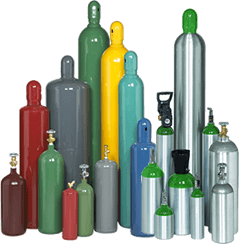Regulators cylinders and cylinder valves must be inspected regularly to ensure safe operation.
Compressed gas cylinder storage requirements osha.
Industrial gas cylinders are color coded to provide identification at a glance.
Osha standard 1910 101 compressed gases and cylinders must be properly stored transported and used to prevent injury and accidents.
The occupational safety and health administration osha references general requirements for compressed gases in 29 code of federal regulations cfr 1910 101 and specific gas requirements are found in.
29 cfr 1910 103 hydrogen.
Hazards associated with compressed gases include oxygen displacement fires explosions and toxic gas exposures as well as the physical hazards associated with high pressure systems.
The handling use and storage of compressed gas cylinders in applications other than welding and cutting in general industry workplaces is governed by osha s compressed gases standard 29 cfr 1910 101.
Include firewalls for cylinders with contents that pose different types of hazards.
Special storage use and handling precautions are necessary in order to control these hazards.
29 cfr 1910 102 acetylene.
Osha compressed gas cylinders common oversights of safety issues found within osha regulations excerpts the actual osha standard 1910 253 b 2 ii says inside of buildings cylinders shall be stored in a well protected well ventilated dry location at least 20 6 1m feet from highly combustible materials such as oil or excelsior.
The in plant handling storage and utilization of all compressed gases in cylinders portable tanks rail tankcars or motor vehicle cargo tanks shall be in accordance with compressed gas association pamphlet p 1 1965 which is incorporated by reference as specified in sec.
29 cfr 1910 105 nitrous oxide.
Oxidizers should not rest within twenty feet of gases which are flammable.

